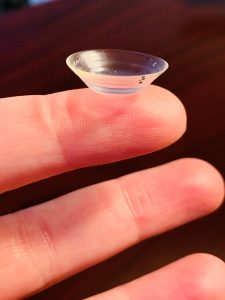People who use PROSE devices or wear contact lenses may be especially prone to infections; therefore, practicing good hygiene and following device care instructions are critical to maintaining healthy eyes.

Acanthamoeba Infection and Keratitis
Acanthamoeba is an organism that is found in soil, dust, and water, including chlorinated pools, bottled drinking water, and tap water. Once this organism affects the eye, it feeds on the bacteria that can be found on poorly cleaned contact lenses and cases. The organism spreads quickly as it attacks the cornea and begins destroying tissue. Unless caught early, treatment of this infection can take months and is not always successful. At its worst, the infection can necessitate a corneal transplant or result in blindness. This parasitic infection can occur in conjunction with a bacterial infection called keratitis, which is an infection of the cornea. This additional corneal infection is also more common in contact lens wearers and can compound accurate diagnosis and treatment.
Symptoms include eye pain, redness, discharge, light sensitivity, and foreign body sensation. People who experience any sign of eye infection, especially those who use PROSE devices or contact lenses, should consult their eye care provider to ensure accurate diagnosis and prompt treatment to prevent complications and preserve sight.
Healthcare professionals recommend that the best ways to prevent these infections are to follow lens and device care protocols exactly as instructed and to always use good hygiene prior to touching the eyes, handling lenses, or using any components needed for care and disinfection. PROSE use and care guidelines are on our website under Application and Removal Resources.
Remember to:
- Always wash hands before insertion or removal.
- Don’t allow tap water to come in contact with lenses.
- Never re-use saline or disinfecting solutions.
- Exchange cases at least every few months.
- Use only solutions recommended by your eye-care provider.
While it may be tempting to take shortcuts in the interest of saving time or money, these shortcuts could cost you your vision.
This post is part of BostonSight’s archival content and was originally authored by Janice M. Epstein. Content has been updated to be current. This content is informational in nature and should not be considered medical advice. Please reach out to your medical professional for questions about your vision.